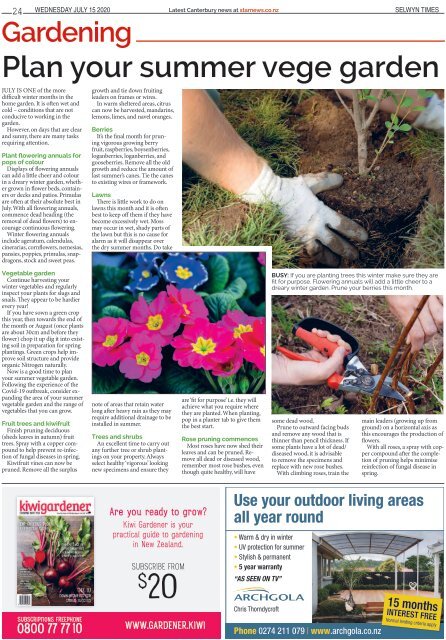You also want an ePaper? Increase the reach of your titles
YUMPU automatically turns print PDFs into web optimized ePapers that Google loves.
24<br />
Wednesday <strong>July</strong> <strong>15</strong> <strong>2020</strong><br />
Gardening<br />
Latest Canterbury news at starnews.co.nz<br />
SELWYN TIMES<br />
Plan your summer vege garden<br />
JULY IS ONE of the more<br />
difficult winter months in the<br />
home garden. It is often wet and<br />
cold – conditions that are not<br />
conducive to working in the<br />
garden.<br />
However, on days that are clear<br />
and sunny, there are many tasks<br />
requiring attention.<br />
Plant flowering annuals for<br />
pops of colour<br />
Displays of flowering annuals<br />
can add a little cheer and colour<br />
in a dreary winter garden, whether<br />
grown in flower beds, containers<br />
or decks and patios. Primulas<br />
are often at their absolute best in<br />
<strong>July</strong>. With all flowering annuals,<br />
commence dead heading (the<br />
removal of dead flowers) to encourage<br />
continuous flowering.<br />
Winter flowering annuals<br />
include ageratum, calendulas,<br />
cinerarias, cornflowers, nemesias,<br />
pansies, poppies, primulas, snapdragons,<br />
stock and sweet peas.<br />
growth and tie down fruiting<br />
leaders on frames or wires.<br />
In warm sheltered areas, citrus<br />
can now be harvested, mandarins,<br />
lemons, limes, and navel oranges.<br />
Berries<br />
It’s the final month for pruning<br />
vigorous growing berry<br />
fruit, raspberries, boysenberries,<br />
loganberries, loganberries, and<br />
gooseberries. Remove all the old<br />
growth and reduce the amount of<br />
last summer’s canes. Tie the canes<br />
to existing wires or framework.<br />
Lawns<br />
There is little work to do on<br />
lawns this month and it is often<br />
best to keep off them if they have<br />
become excessively wet. Moss<br />
may occur in wet, shady parts of<br />
the lawn but this is no cause for<br />
alarm as it will disappear over<br />
the dry summer months. Do take<br />
Vegetable garden<br />
Continue harvesting your<br />
winter vegetables and regularly<br />
inspect your plants for slugs and<br />
snails. They appear to be hardier<br />
every year!<br />
If you have sown a green crop<br />
this year, then towards the end of<br />
the month or August (once plants<br />
are about 30cm and before they<br />
flower) chop it up dig it into existing<br />
soil in preparation for spring<br />
plantings. Green crops help improve<br />
soil structure and provide<br />
organic Nitrogen naturally.<br />
Now is a good time to plan<br />
your summer vegetable garden.<br />
Following the experience of the<br />
Covid-19 outbreak, consider expanding<br />
the area of your summer<br />
vegetable garden and the range of<br />
vegetables that you can grow.<br />
Fruit trees and kiwifruit<br />
Finish pruning deciduous<br />
(sheds leaves in autumn) fruit<br />
trees. Spray with a copper compound<br />
to help prevent re-infection<br />
of fungal diseases in spring.<br />
Kiwifruit vines can now be<br />
pruned. Remove all the surplus<br />
note of areas that retain water<br />
long after heavy rain as they may<br />
require additional drainage to be<br />
installed in summer.<br />
Trees and shrubs<br />
An excellent time to carry out<br />
any further tree or shrub plantings<br />
on your property. Always<br />
select healthy ‘vigorous’ looking<br />
new specimens and ensure they<br />
are ‘fit for purpose’ i.e. they will<br />
achieve what you require where<br />
they are planted. When planting,<br />
pop in a planter tab to give them<br />
the best start.<br />
Rose pruning commences<br />
Most roses have now shed their<br />
leaves and can be pruned. Remove<br />
all dead or diseased wood,<br />
remember most rose bushes, even<br />
though quite healthy, will have<br />
BUSY: If you are planting trees this winter make sure they are<br />
fit for purpose. Flowering annuals will add a little cheer to a<br />
dreary winter garden. Prune your berries this month.<br />
some dead wood.<br />
Prune to outward facing buds<br />
and remove any wood that is<br />
thinner than pencil thickness. If<br />
some plants have a lot of dead/<br />
diseased wood, it is advisable<br />
to remove the specimens and<br />
replace with new rose bushes.<br />
With climbing roses, train the<br />
main leaders (growing up from<br />
ground) on a horizontal axis as<br />
this encourages the production of<br />
flowers.<br />
With all roses, a spray with copper<br />
compound after the completion<br />
of pruning helps minimise<br />
reinfection of fungal disease in<br />
spring.<br />
Are you ready to grow?<br />
Kiwi Gardener is your<br />
practical guide to gardening<br />
in New Zealand.<br />
SUBSCRIPTIONS FREEPHONE<br />
0800 77 77 10<br />
SUBSCRIBE FROM<br />
$<br />
20<br />
Use your outdoor living areas<br />
all year round<br />
• Warm & dry in winter<br />
• UV protection for summer<br />
• Stylish & permanent<br />
• 5 year warranty<br />
“AS SEEN ON TV”<br />
WWW.GARDENER.KIWI<br />
Chris Thorndycroft<br />
Phone 0274 211 079 | www.archgola.co.nz<br />
<strong>15</strong> months<br />
INTEREST FREE<br />
Normal lending criteria apply


















